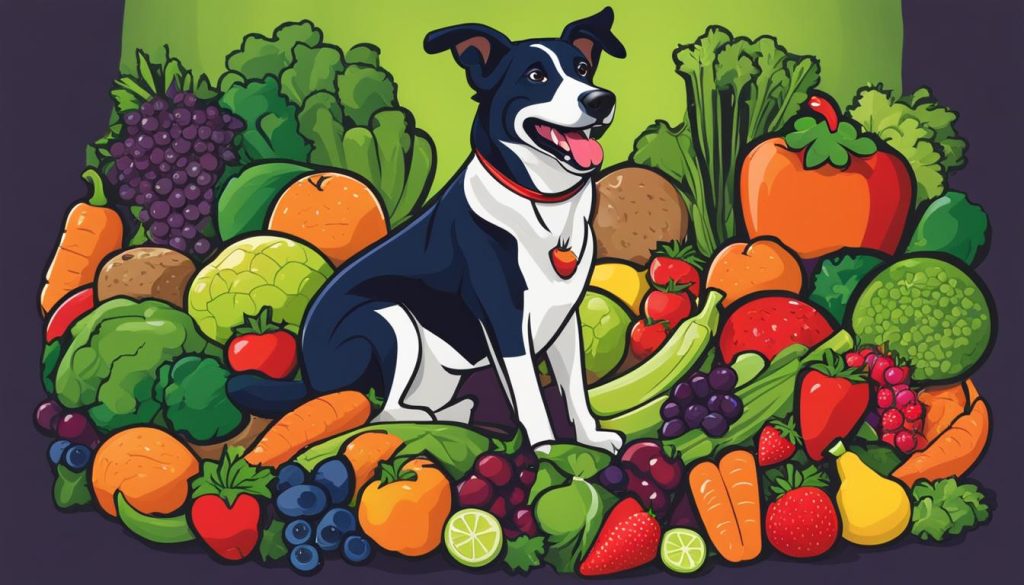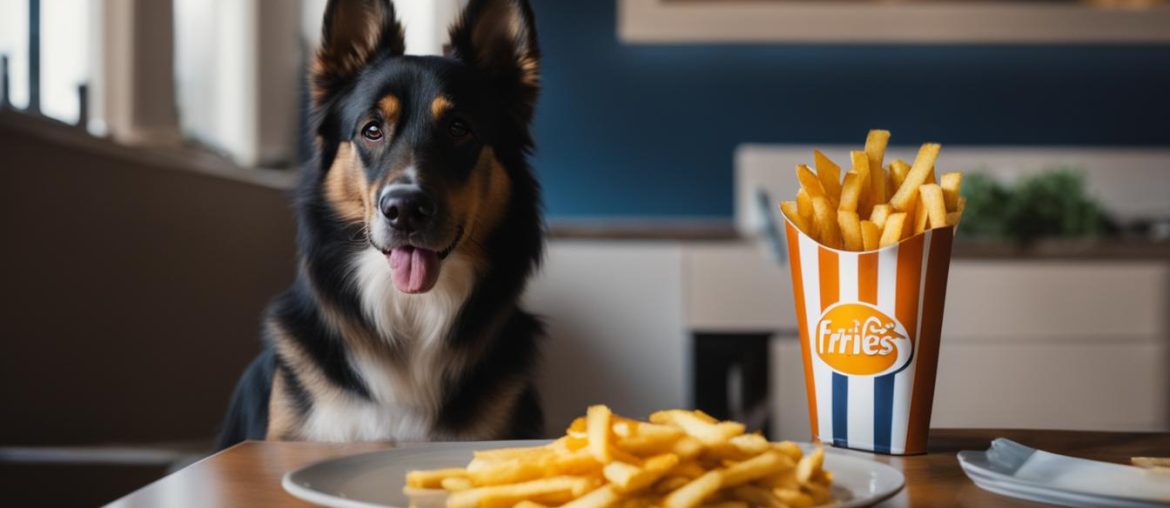As a responsible dog owner, I understand the importance of providing a safe and balanced diet for my furry friend. This includes being mindful of what human foods are suitable for dogs, and today, I want to address the question: Can dogs eat fries?
When it comes to fries, it’s important to exercise caution. While dogs can technically eat fries in moderation, they are not considered a safe or healthy treat for our canine companions. Fries are typically high in fat, salt, and oil, which can be harmful to dogs and lead to various health issues.
It’s essential to note that seasoned fries, especially those containing onion or garlic, can be toxic to dogs. Additionally, the small size of fries can pose a choking hazard for our furry friends. To ensure the well-being of your dog, it’s always best to consult with your veterinarian before introducing any type of potato or fry into their diet.
Key Takeaways:
- Fries are not recommended as a regular treat for dogs due to their high fat, salt, and oil content.
- Seasoned fries containing onion or garlic can be toxic to dogs.
- Fries can pose a choking hazard due to their small size.
- Consult with your vet before feeding your dog any type of potato or fry.
- Choose healthier alternatives like baked sweet potato slices or thinly sliced and baked regular potatoes in moderation.
Are French Fries Safe for Dogs?

When it comes to feeding your furry friend, it’s important to consider their health and dietary needs. As much as we love indulging in a plate of crispy french fries, it’s essential to understand whether they are safe for dogs. While french fries themselves are not toxic to dogs, they are not recommended as a regular treat due to their unhealthy nature.
French fries are high in fat, calories, and sodium, which can lead to various health issues in dogs. Excessive fat consumption can cause pancreatitis and obesity, while the high salt content can result in dehydration and salt poisoning. Additionally, some dogs may be allergic to potatoes, further exacerbating the risks associated with feeding them french fries.
To ensure the well-being of your canine companion, it is best to limit their consumption of french fries or avoid them altogether. However, if you still want to share this guilty pleasure with your dog, opt for plain fries without any seasoning or salt. It’s crucial to keep the portion size small and offer them as an occasional treat rather than a regular part of their diet.
Healthy Treat Alternatives for Dogs
If you’re looking for alternative treats that are both safe and healthy for your dog, there are plenty of options to choose from. Instead of french fries, consider offering your furry friend baked sweet potato slices or thinly sliced and baked regular potatoes. These alternatives provide a healthier alternative to traditional fries while still satisfying your dog’s cravings.
In summary, while dogs can eat french fries in moderation, it is important to remember that they lack nutritional value and can be detrimental to their health if consumed regularly. Prioritize your dog’s well-being by opting for healthier treats that provide essential nutrients and maintain a balanced diet.
How to Feed Your Dog Fries

If you want to share fries with your dog, it’s important to do so in a safe and moderate way. Here are some guidelines to follow:
- Choose plain fries: Opt for plain fries without any seasoning or salt. This reduces the risk of your dog consuming harmful ingredients.
- Avoid condiments: Do not let your dog have any condiments like ketchup or mayonnaise, as they may contain ingredients that are toxic to dogs.
- Limit the portion size: It’s best to give your dog only one or two fries a few times a week. This helps to prevent overconsumption of unhealthy fats and excessive calorie intake.
Feeding your dog fries should not become a regular habit. While it’s fine to occasionally share a few fries, it’s important to prioritize a balanced and nutritious diet for your furry friend. Always consult with your vet before introducing any new food into your dog’s diet.
Remember, feeding your dog fries should only be done in moderation. There are healthier alternatives available that can provide essential nutrients for your dog’s well-being.
Table: Moderation Guide for Feeding Your Dog Fries
| Fry Type | Portion Size | Frequency |
|---|---|---|
| Plain Fries | 1-2 fries | A few times a week |
Can dogs eat french fries every day?
While it may be tempting to share your delicious french fries with your furry friend, it’s important to consider their overall health and nutritional needs. Dogs should not have french fries every day as they can be detrimental to their well-being. Let’s take a closer look at why frequent consumption of french fries is not recommended for dogs.
1. High fat and calorie content: French fries are typically deep-fried in oil, making them high in fat and calories. Regularly feeding your dog fries can lead to weight gain, obesity, and related health issues. It’s crucial to maintain a balanced and healthy diet for your canine companion.
2. Excessive sodium levels: French fries often contain added salt or are seasoned with salt. Dogs have a lower tolerance for sodium compared to humans, and frequent consumption of salty foods like fries can lead to dehydration, electrolyte imbalances, and even salt poisoning.
3. Potential digestive issues: Dogs have a different digestive system than humans, and their bodies may struggle to process the high levels of oil and additives found in french fries. Feeding your dog fries every day can result in gastrointestinal distress, including upset stomach, diarrhea, and pancreatitis.
While an occasional fry as a treat won’t likely harm your dog, it’s crucial to prioritize their overall health and provide them with a balanced diet that meets their nutritional needs. Opt for healthier alternatives and treats specifically formulated for dogs to ensure their well-being and longevity.
What to do if your dog accidentally eats french fries

If your dog accidentally eats a few fries, they will most likely be fine. However, it’s important to keep an eye on their behavior and monitor them for any signs of illness such as vomiting or diarrhea. While fries may not be toxic to dogs, the high fat, salt, and oil content can still cause digestive upset. Provide your dog with plenty of fresh water to help dilute the salt and flush it out of their system. It’s also a good idea to offer them a bland meal of boiled chicken and rice to help settle their stomach.
If you notice any severe symptoms or if your dog has consumed a large amount of fries, it’s best to contact your veterinarian for guidance. They may recommend bringing your dog in for an examination or providing further instructions based on your dog’s specific situation. Remember, it’s always better to err on the side of caution when it comes to your pet’s health.
In the future, be sure to keep fries and other human foods out of your dog’s reach to prevent any accidental ingestion. It’s essential to provide your dog with a balanced and nutritious diet that is specifically formulated for their needs. If you’re looking for alternative snack options, there are plenty of dog-friendly treats available that are both tasty and healthy.
Table: Signs of illness in dogs after consuming fries
| Signs of Illness | What to Do |
|---|---|
| Vomiting or diarrhea | Monitor your dog closely and provide ample water. If symptoms persist or worsen, contact your vet. |
| Lethargy or weakness | Keep an eye on your dog’s energy levels. If they seem unusually tired or weak, consult with your vet. |
| Excessive thirst or urination | Ensure your dog has access to fresh water and monitor their drinking and urination habits. If it becomes excessive, consult your vet. |
Remember, the health and well-being of your dog should always be a priority. While the occasional accidental consumption of fries may not be cause for immediate concern, it’s important to take appropriate steps to ensure your dog’s safety and prevent any potential complications.
Dog-friendly alternatives to french fries

While french fries are not recommended for dogs due to their high fat, salt, and oil content, there are alternative options that can be both safe and healthy for your furry friend. These dog-friendly alternatives provide a nutritious and tasty snack that you can feel good about giving to your dog. Here are a few options to consider:
Baked sweet potato slices
Sweet potatoes are a great alternative to regular fries as they are a good source of fiber, vitamins, and minerals. To make a dog-friendly version, simply slice a sweet potato into thin rounds and bake them in the oven until they are crispy. Sweet potato slices make for a crunchy and delicious treat that your dog will love.
Thinly sliced and baked regular potatoes
If your dog enjoys the taste of potatoes, you can also make a healthier version by thinly slicing regular potatoes and baking them in the oven. Remember to avoid adding any oil or seasonings, as these can be harmful to dogs. The baked potato slices will provide a satisfying crunch without the added fats and sodium found in regular fries.
Both of these options offer a dog-friendly alternative to french fries that can be enjoyed in moderation. Remember to cut the slices into small, thin pieces to prevent choking and always consult with your vet before introducing new foods into your dog’s diet.
Are there any benefits to feeding a dog french fries?

Feeding french fries to dogs does not provide any significant benefits to their overall health and well-being. While potatoes, the main ingredient in french fries, contain certain nutrients such as potassium, Vitamin C, and magnesium, the high fat, sodium, and oil content in fries outweigh any potential benefits.
Excessive consumption of fries can lead to various health issues in dogs, including pancreatitis and obesity. These conditions can have long-term effects on a dog’s overall health and quality of life. Therefore, it is best to offer your dog healthier snack options that provide essential nutrients while avoiding the potential risks associated with french fries.
“Feeding fries to dogs can lead to pancreatitis and obesity, which can have detrimental effects on their health.”
Instead of relying on fries as a source of nutrition, pet owners should focus on providing their dogs with a balanced diet consisting of high-quality dog food and appropriate treats specifically formulated for canine nutritional needs. These options ensure that dogs receive the necessary nutrients they require for optimal health.
It is important to consult with your veterinarian to determine the best diet and treat options for your individual dog. They can provide guidance on safe foods, portion sizes, and help tailor a diet plan that meets your dog’s unique dietary requirements.
| Benefit | French Fries | Healthy Alternatives |
|---|---|---|
| Vitamin C | Low | Varies depending on the alternative |
| Potassium | Varies depending on the potato used | Depends on the alternative |
| Magnesium | Low | Varies depending on the alternative |
| Fat | High | Varies depending on the alternative |
| Sodium | High | Negligible to low |
Table: Comparison of Nutritional Content between French Fries and Healthy Alternatives
What Other Human Snacks Are Safe for Dogs?

While french fries may not be the healthiest treat for dogs, there are plenty of other human snacks that are safe and nutritious for our furry friends. These snacks can be a tasty way to reward your dog or add variety to their diet. Here are some dog-friendly foods that you can share with your four-legged companion:
Fruits and Vegetables:
- Bananas: Rich in potassium and vitamins, bananas make a delicious and nutritious snack for dogs. Just remember to remove the peel and give small pieces to prevent choking.
- Carrots: Crunchy and low in calories, carrots are a great option for dogs. They are packed with vitamins and can help keep your dog’s teeth clean and healthy.
- Apples: Apples are a good source of fiber and vitamins for dogs. Make sure to remove the seeds and core before feeding them to your furry friend.
- Broccoli: Broccoli is a nutrient-rich vegetable that can be given to dogs in small amounts. It contains vitamins, minerals, and fiber that contribute to overall canine health.
Dry Fruits:
If your dog enjoys crunchy snacks, you can offer them some dry fruits in moderation. Nuts like almonds, cashews, and pistachios can be given as long as they are unsalted and without any added seasonings. These nuts provide healthy fats, protein, and important nutrients for your dog.
Remember to always introduce new foods gradually and in small portions to avoid any digestive issues. If you notice any adverse reactions or allergies, it’s best to consult with your veterinarian. Additionally, keep in mind that these snacks should only be given as occasional treats and not as a substitute for a balanced dog diet.
Next time you’re looking for a safe and healthy snack to share with your dog, consider these dog-friendly fruits, vegetables, and dry fruits. Your furry friend will appreciate the tasty treat, and you can feel good knowing that you’re providing them with nutritious snacks.
Wrapping Up
To summarize, while dogs can eat fries in moderation, it is not recommended as a regular part of their diet. Fries are high in fat, salt, and oil, which can have negative effects on a dog’s health. Regular consumption of fries can lead to weight gain, pancreatitis, and other health issues. Therefore, it is important to consider healthier treat options for your furry friend.
When it comes to your dog’s diet, it is essential to prioritize their overall well-being. Instead of fries, opt for healthier snacks that provide essential nutrients and support their overall health. There are various healthy treats available for dogs, including baked sweet potato slices or thinly sliced and baked regular potatoes. These alternatives are a safer and more nutritious option for your dog.
Remember, it is always advisable to consult with your veterinarian before introducing any new foods into your dog’s diet. Your vet can provide personalized advice and guidance based on your dog’s specific needs. By making informed choices and prioritizing your dog’s health, you can ensure that they live a happy and healthy life.
FAQ
Can dogs eat fries?
Dogs can eat fries in moderation, but it is not recommended as a regular treat. Fries are high in fat, salt, and oil, which can be harmful to dogs.
Are french fries safe for dogs?
French fries are not toxic to dogs, but they are unhealthy and lack nutritional value. They are high in fat, calories, and sodium.
How to feed your dog fries?
If you want to share fries with your dog, make sure they are plain and without any seasoning or salt. Avoid letting your dog have any condiments as they may contain ingredients that are toxic to dogs.
Can dogs eat french fries every day?
Dogs should not have fries every day. Eating too many fries can cause an upset stomach, dehydration, weight gain, and even pancreatitis.
What to do if your dog accidentally eats french fries?
If your dog accidentally eats a few fries, they will most likely be fine. Keep an eye on their behavior and monitor them for any signs of illness such as vomiting or diarrhea.
Dog-friendly alternatives to french fries?
Instead of giving your dog regular french fries, you can make dog-friendly alternatives at home. Baked sweet potato slices or thinly sliced and baked regular potatoes can be a healthier option for your dog.
Are there any benefits to feeding a dog french fries?
While potatoes have some nutritional benefits such as potassium, Vitamin C, and magnesium, the high fat, sodium, and oil content in french fries outweigh any potential benefits.
What other human snacks are safe for dogs?
Dogs can enjoy certain vegetables like asparagus, broccoli, carrots, and bell peppers. They can also have fruits like bananas, oranges, and apples in moderation.
Wrapping Up
Dogs can eat fries in moderation, but it is not recommended due to the high fat, salt, and oil content. Regular consumption of fries can lead to various health issues in dogs. It is best to opt for healthier snack options that provide essential nutrients and keep your dog healthy and active.






